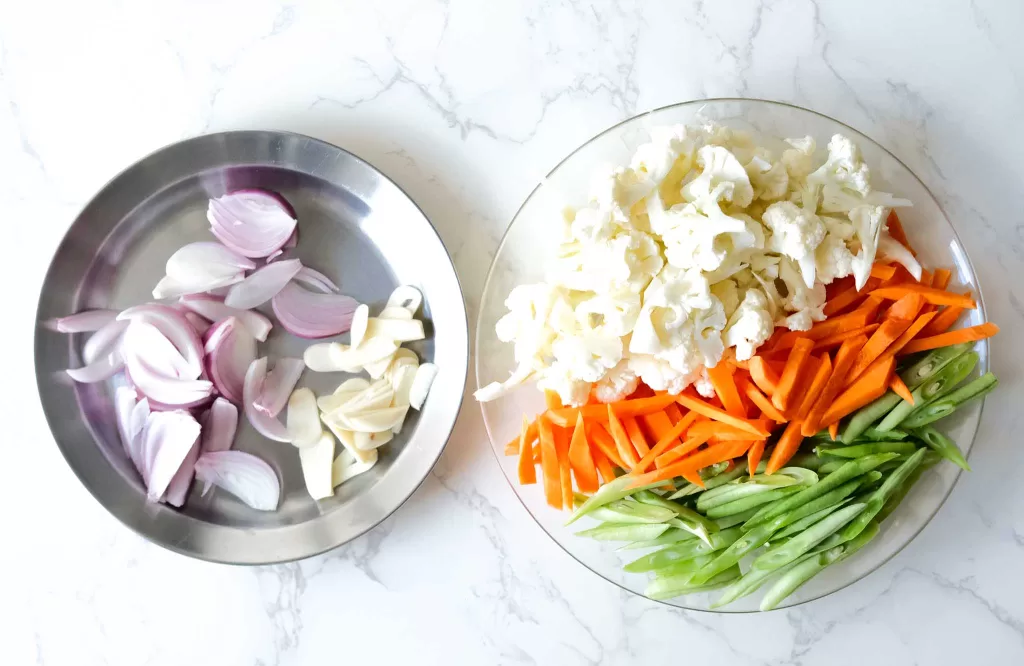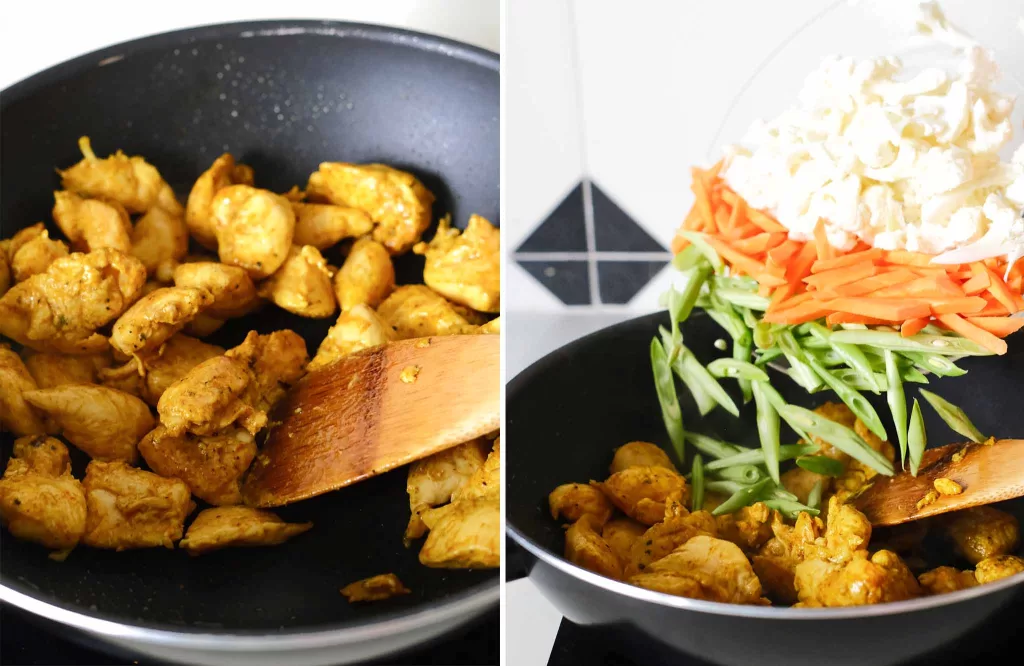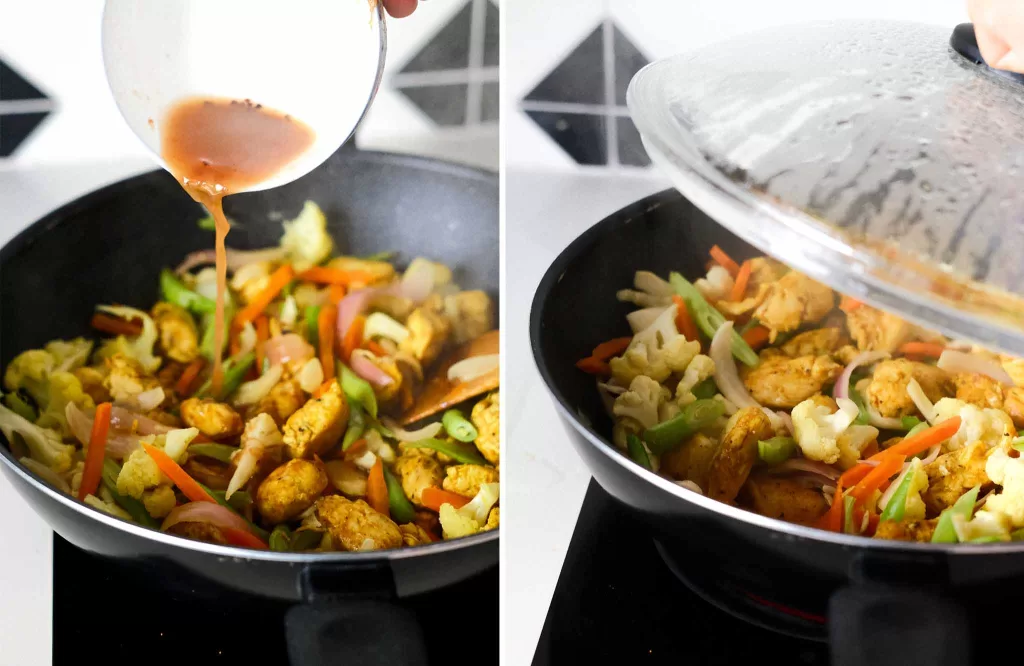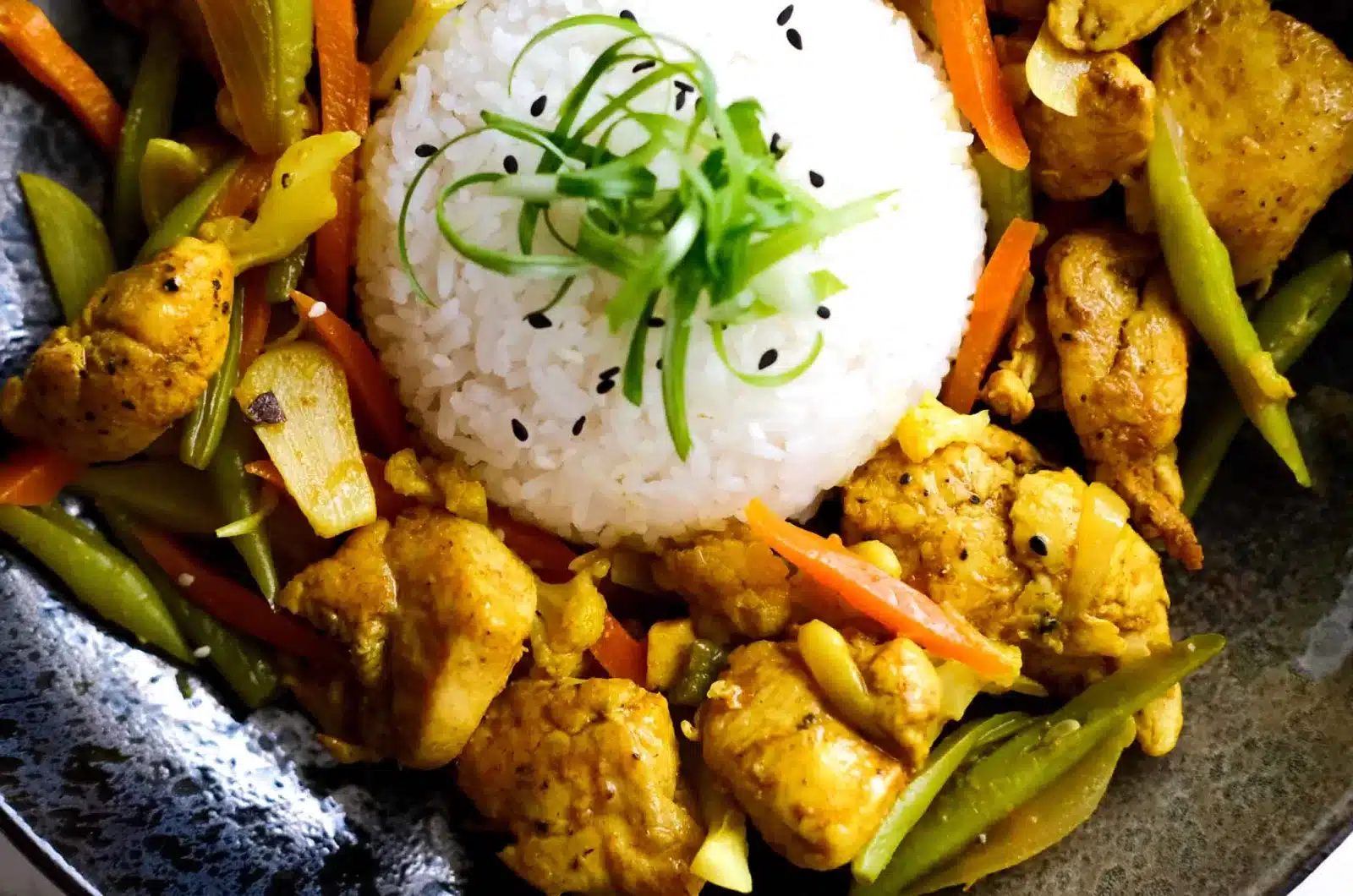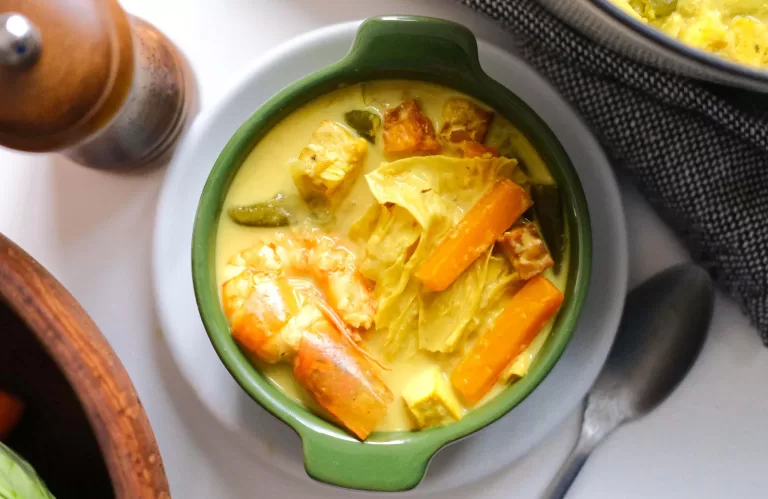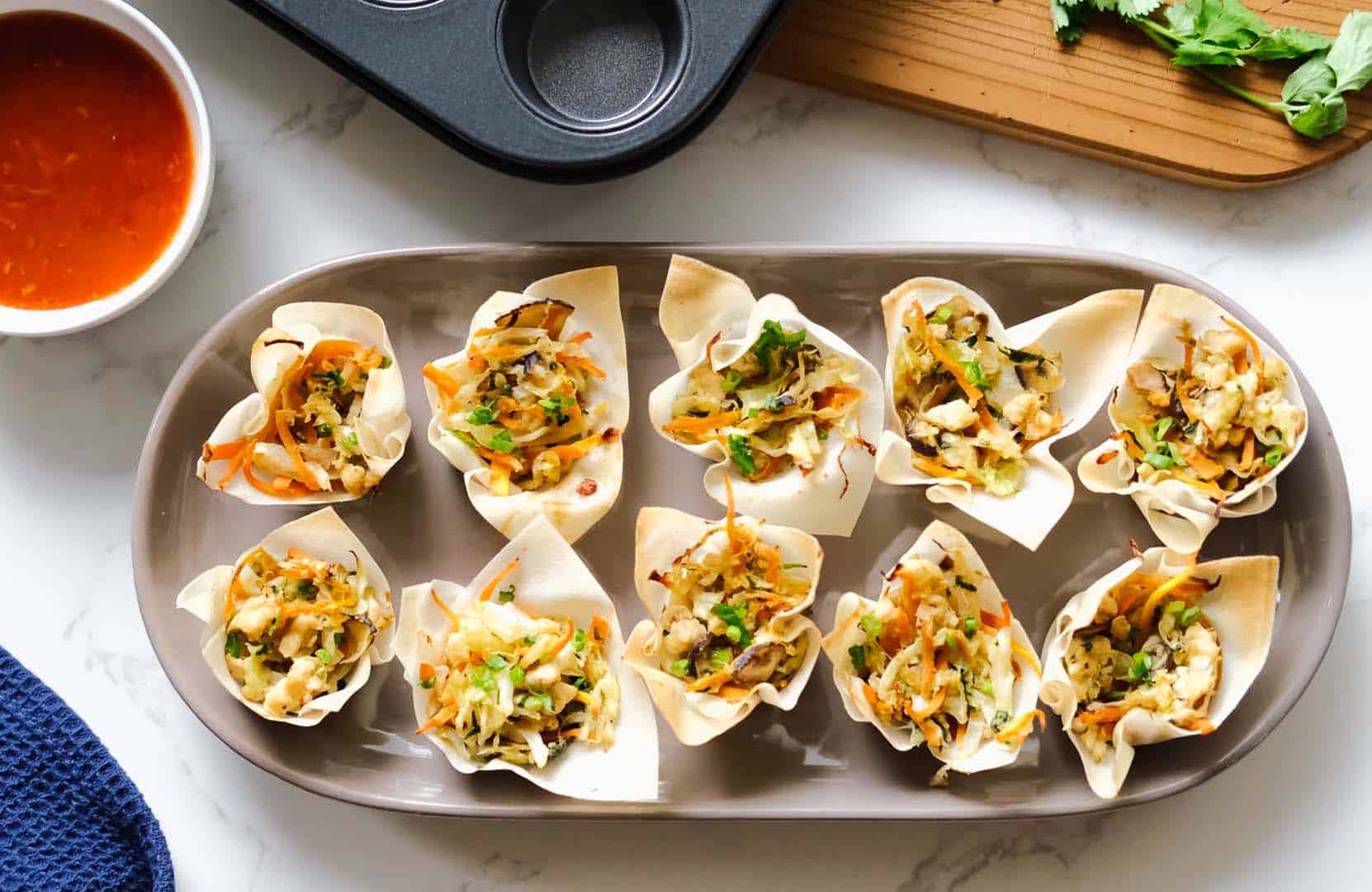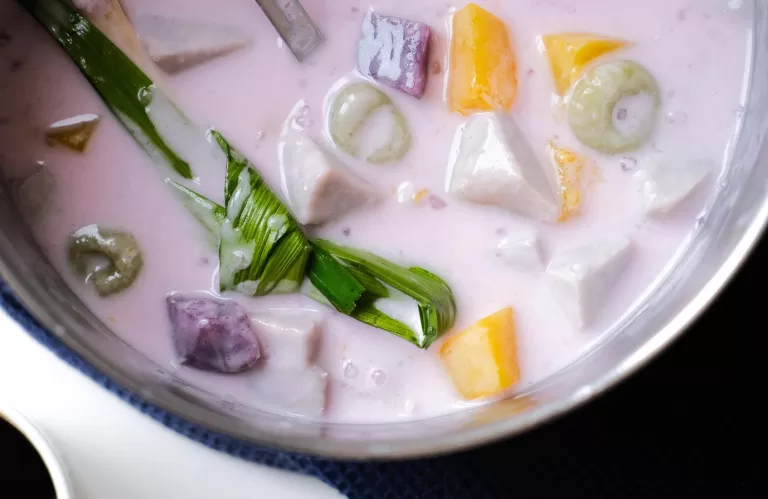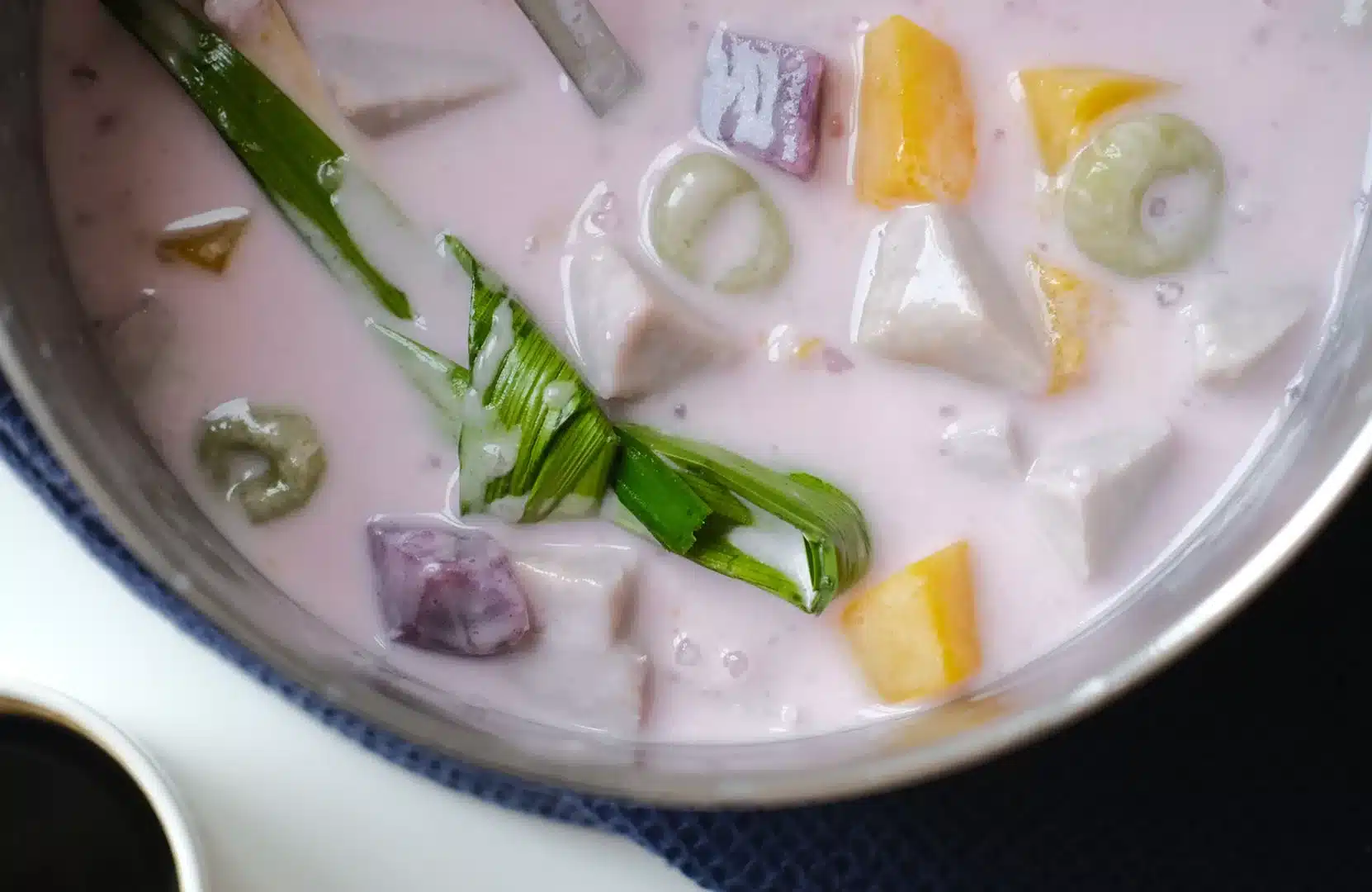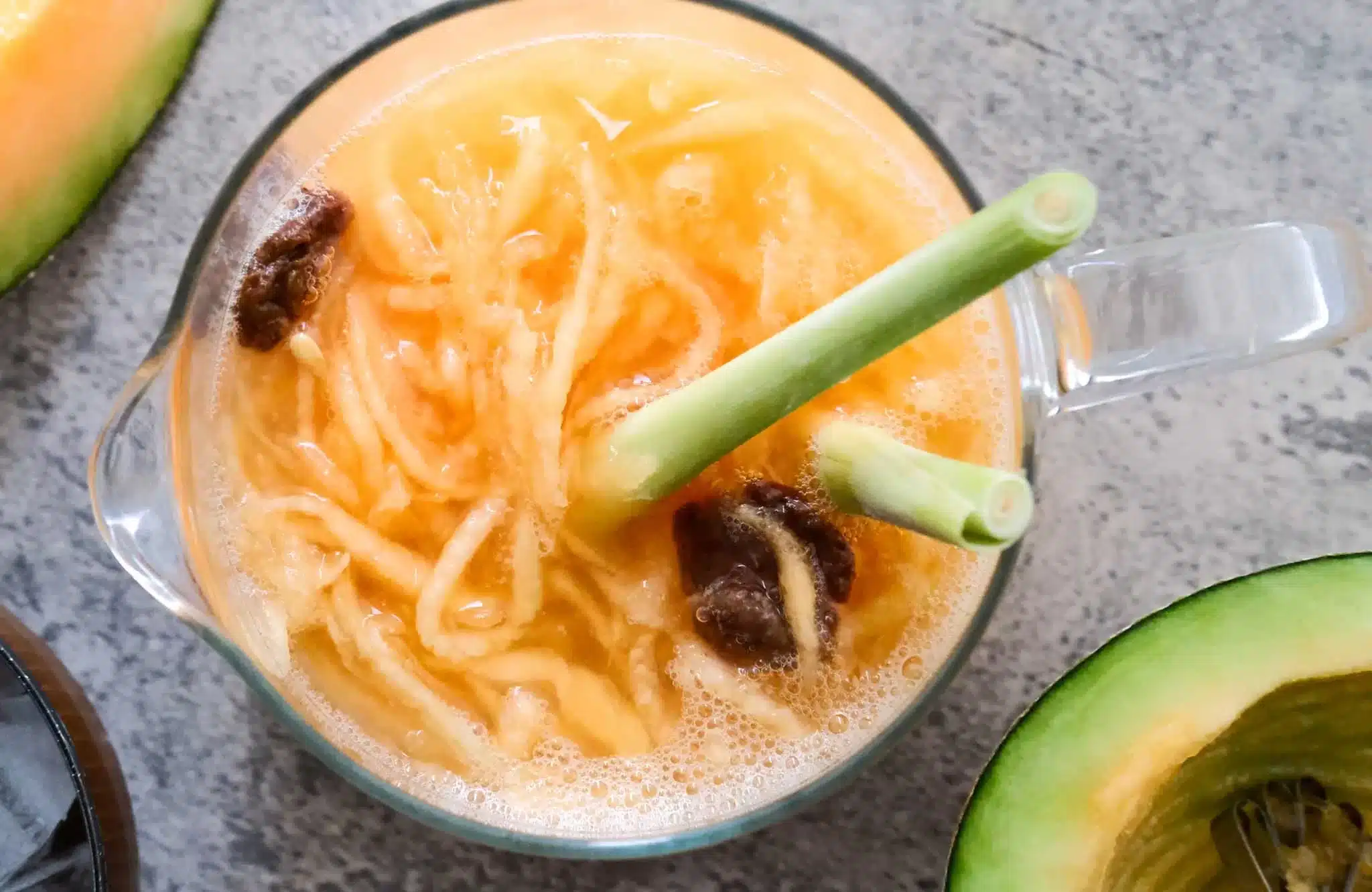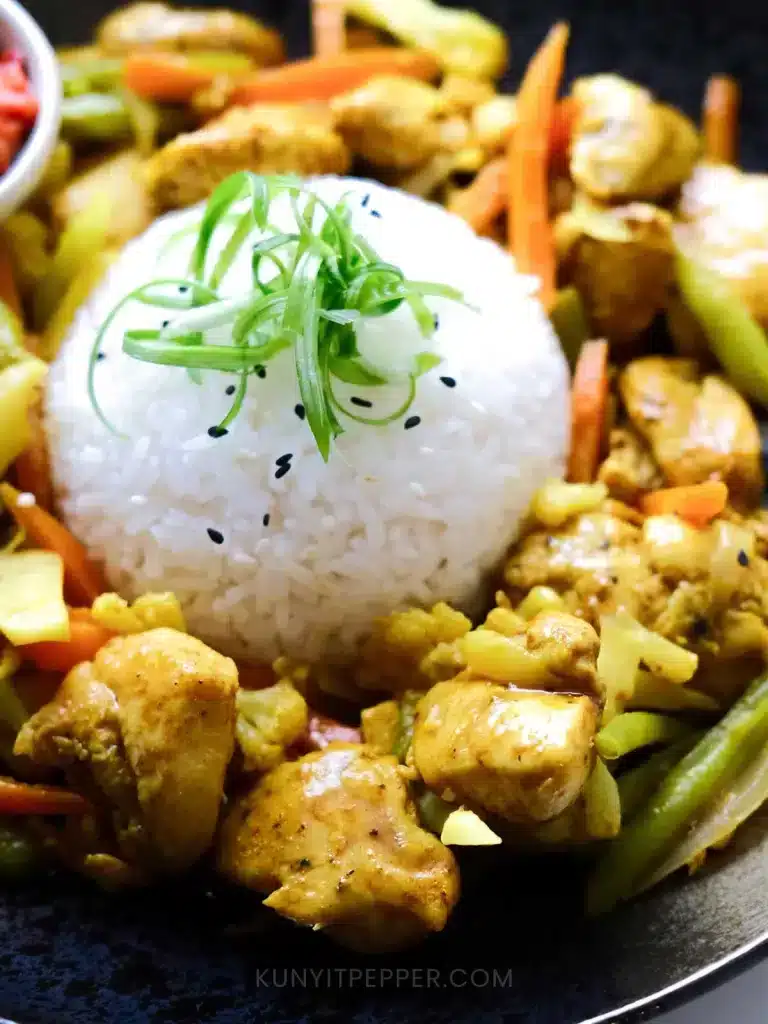
About this Turmeric Black Pepper Chicken
This Turmeric Black Pepper Chicken recipe is inspired by the classic Malaysian ayam masak kunyit my mom likes to make — which translates to “chicken cooked in turmeric.” It’s a popular street food and a go-to quick chicken turmeric cooked with basic vegetables. Typically, carrots, cauliflower, and beans.
Commonly served with warm rice, sambal, and sweet soy sauce to complete the dish, this turmeric black pepper chicken is known as an easy chicken recipe in my family and most households, whether for lunch or dinner.
There are two versions of turmeric black pepper chicken in Malaysia, the dry, deep-fried one, and the stir-fried version with juicier chicken and more glaze. This recipe is the latter, made with less oil to retain the nutritional value and the anti-inflammatory properties.
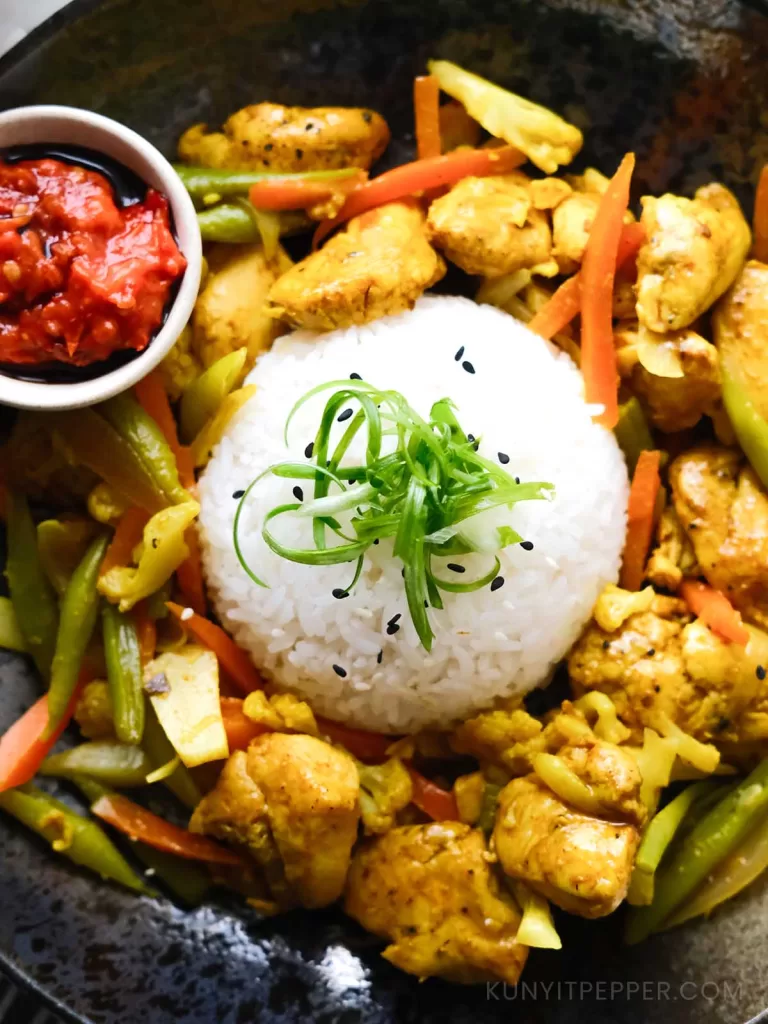
Table of Contents
- About this Turmeric Black Pepper Chicken
- Why you will like this Turmeric Black Pepper Chicken
- What’s Good in This Dish
- About Tamarind
- Ingredients to Make Turmeric Black Pepper Chicken
- Other vegetable options (additional/substitution)
- How to Make Turmeric Black Pepper Chicken
- Serving suggestions and related recipes to pair with it
- FAQ
Why you will like this Turmeric Black Pepper Chicken
- Simple to make chicken dish – Done in just 15 minutes, using basic ingredients.
- A seamless way to sneak in anti-inflammatory ingredients to your lunch and dinner dishes – Turmeric, black pepper, garlic, and natural tamarind paste are packed with anti-inflammatory benefits.
- Flexible to cook with other vegetables – You can toss any vegetable you have in the fridge, such as asparagus, broccoli, cauliflower, bell pepper, or peas, to cook with it.
- A quick high-protein meal to pair with rice for lunch and dinner.
- Made with less oil
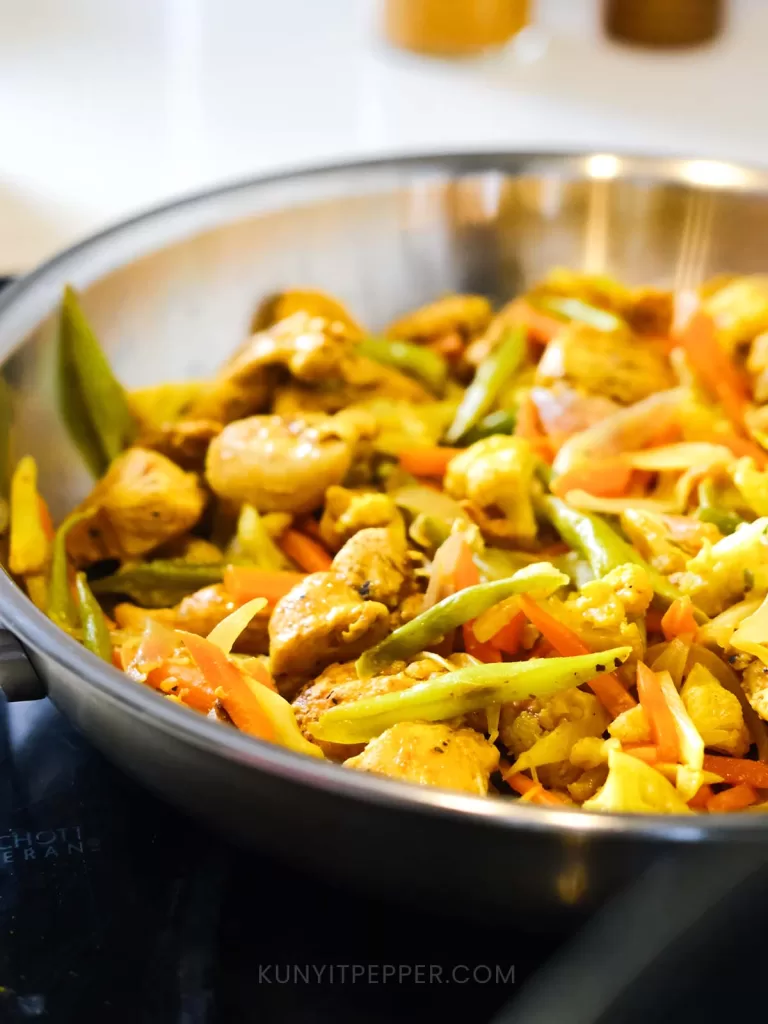
Recipe highlight & summary
This Asian stir-fry chicken is seasoned with basic turmeric, black pepper, and sliced garlic, stir-fried with everyday vegetables, and glazed with tamarind.
It’s packed with anti-inflammatory ingredients that come with health benefits! Done in just 20 minutes, this turmeric chicken dish is an easy, comforting, protein-packed dish to pair with rice.
What’s Good in This Dish
- Tamarind – Adds vitamin C and has a sweet and sour flavor
- Turmeric – Known to reduce inflammation & support immunity
- Black pepper – Boosts turmeric absorption
- Garlic – Traditionally used to support heart health
About Tamarind
Tamarind pulp, paste, puree, or concentrated is common in Southeast Asian cuisines, including Thai, Malaysian, Indonesian, Singaporean, and Vietnamese. Its sweet and sour flavor helps to elevate savory dishes in the most natural way.
Apart from being a souring agent, tamarind paste also makes a nutritious addition. They are rich in magnesium and contain polyphenols with antioxidant and anti-inflammatory benefits.
✏️ Antioxidants – Natural substances that help protect our cells from damage, potentially reducing the risk of chronic diseases.
Because of its caramel-like texture, tamarind paste creates a sticky glaze that coats the chicken and vegetables, adding depth and flavor.
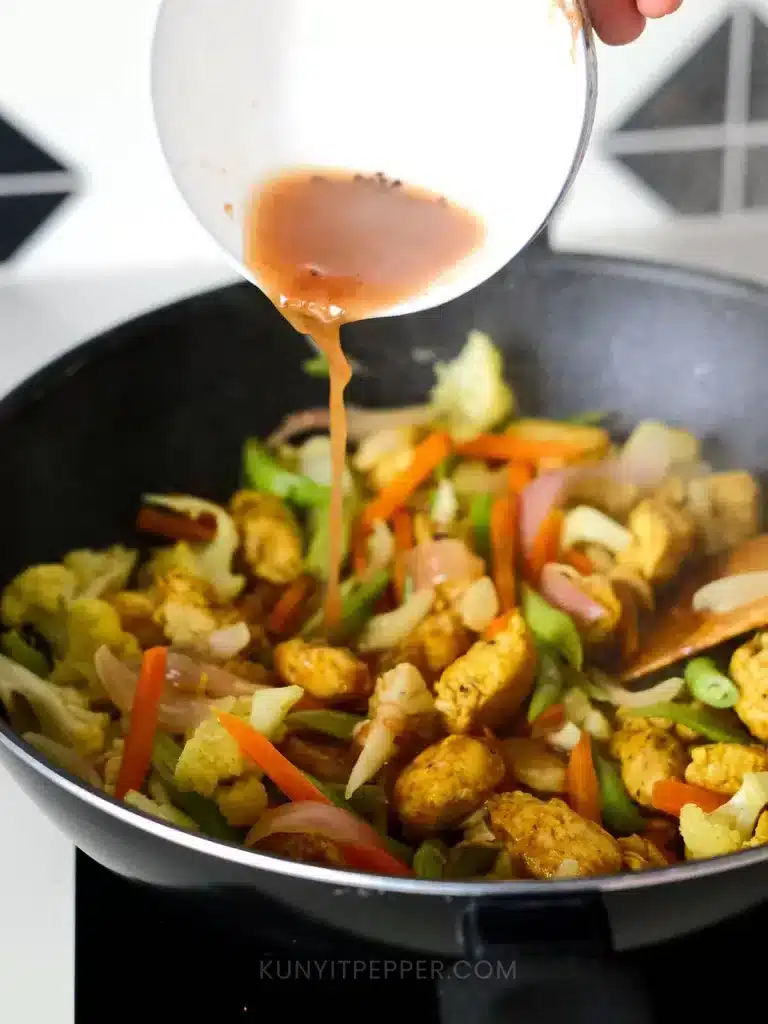
Traditional Use of Tamarind to Clean Chicken
In my family, we also use tamarind to wash chicken and help remove any unwanted smell before cooking. I still remember seeing a bowl of raw chicken coated in tamarind whenever my mom made dishes with chicken thighs. It wasn’t exactly a pleasant sight when you were little and knew nothing about cooking, but I guess that explains why I’ve become so picky about the smell of chicken in certain dishes.
To use tamarind to temper the chicken’s smell, rub the chicken with tamarind paste and leave it for 10-15 minutes before washing it off. For every whole chicken, use about 5tbsp of tamarind pulp.
Ingredients to Make Turmeric Black Pepper Chicken
- Chicken – For lean protein, go for chicken breast or fillet. If you like them juicy, use the thigh part.
- Tamarind – The acidic agent that gives a mild sourness and sweetness. It creates a glaze on the dish.
- Turmeric, pepper, and salt – Rub these seasonings into the chicken and leave them to marinate for a while (at least 15 minutes). This helps the chicken absorb the flavor better.
- Onion – I use red onion. You can also use sweet onion for a milder and sweeter option.
- Garlic – Slice it thinly.
- Green beans – Sometimes they are called French beans. You can also use long beans.
- Carrot – The carrot adds a natural sweetness, so I never skip it in this dish. Cut them into small to medium sticks.
- Cauliflower – Cut into small florets so it cooks evenly and quickly.
- Oil – I use avocado oil.
Other vegetable options (additional/substitution)
- Asparagus
- Broccoli
- Long beans
- Peas
How to Make Turmeric Black Pepper Chicken
- Prep the Chicken
Cut the chicken into bite-sized cubes and transfer them to a bowl. Add turmeric, black pepper, and salt, then rub to coat the pieces evenly. Let it marinate for a while, while you prepare the vegetables.
- Prep the vegetables
Cut all the vegetables into small pieces.
- Stir-Fry the Chicken
Heat a bit of oil in a non-stick pan over medium heat. Add the marinated chicken and stir-fry using a spatula until the pieces are no longer pink.
- Steam the vegetables with tamarind.
Toss in the vegetables and continue stir-frying for another minute to combine. Then, add the tamarind paste or the slurry and mix well. Cover the pan with a lid, and let it steam over low heat for about 5-7 minutes. This helps soften the vegetables and allows the chicken to absorb some of the flavorful juices.
- Adjust accordingly and serve
Taste and adjust the moisture and flavor to your preference. To make it drier, stir-fry for a bit more. And since tamarind comes in various forms (pulp, purée, or paste) the concentration may vary.
Serving suggestions and related recipes to pair with it
Served over warm rice. I like it next to my Brown Rice and Quinoa for a wholegrain choice. It’s also great with Aromatic Indonesian Turmeric Rice for a more Balinese-style dish.
I like having it next to sambal. Check out my Sambal Ulek with Cherry Tomatoes, or any store-bought Huy Fong Sambal Oelek will do.
FAQ
What can be a substitute for tamarind?
Lemon juice is a basic substitute due to its sour taste. But it’s only a substitute for the acidic, not the sweet, and the caramel texture that creates the glaze.
How to create a substitute for tamarind with lemon
For every 1 tbsp of tamarind paste, mix 1 tbsp of lemon juice + half a tbsp of corn flour + 2 tbsp of water, and stir them into a slurry.
Optional: Add a small amount of sweetener, like sugar, to balance the flavors and bring out a gentle sweetness.
Turmeric with Black Pepper Chicken
4
servings10
minutes10
minutes20
minutesThis chicken recipe is packed with anti-inflammatory superfoods like turmeric, black pepper, and tamarind. Cooked with vegetables into a caramelized glaze, it makes a simple and satisfying dish to enjoy with rice.
Ingredients
500 g Chicken – cut into bite-sized cubes (see above)
80 g 1 carrot – cut into matchsticks
80 g Green beans – sliced
120 g Cauliflower – cut into florets
1 Red onion – sliced
3 cloves Garlic – thinly slice
1.5 tsp Turmeric powder
1 tsp Black pepper
1 tsp Salt
2 tbsp Oil – (Avocado/olive)
4 tbsp Natural tamarind paste/pulp – mixed with 1/4 cup water to loosen
Directions
- Cut and marinate the chicken
Cut the chicken into bite-sized cubes and transfer it to a bowl. Add turmeric, black pepper, and salt, then, using a glove, rub to coat the chicken evenly. Leave it to marinate for a while (about 10-15minutes) and move on to prepare the vegetables. - Prep the vegetables
Cut all the vegetables into small pieces based on the ingredients above. - Stir-Fry the Chicken
Add oil into a non-stick pan or wok and heat it over medium heat. Once it’s hot enough, add the marinated chicken and stir-fry them until the chicken cubes are no longer pink. They don’t need to be fully cooked at this point, - Steam the vegetables with tamarind
Toss in the vegetables and continue stir-frying for another minute to combine. Then, add the tamarind paste or the slurry and mix well. Cover the wok with a lid, and let it steam over low heat for about 5-7 minutes. This helps soften the vegetables and cook the chicken while absorbing some water to make them juicy. - Adjust accordingly before you serve
Taste and adjust the moisture and flavor to your preference. To make it drier, stir-fry for a bit more. And since tamarind comes in various forms (pulp, purée, or paste) the concentration may vary. - Serve while it’s warm next to warm rice. Check my serving suggestion above, along with the recipe you can pair,
Notes
- Since this recipe uses less oil, I prefer a non-stick pan/wok. It helps prevent sticking and burning.
🥣 Did you try this recipe? Let me know your thoughts in the comments below.



